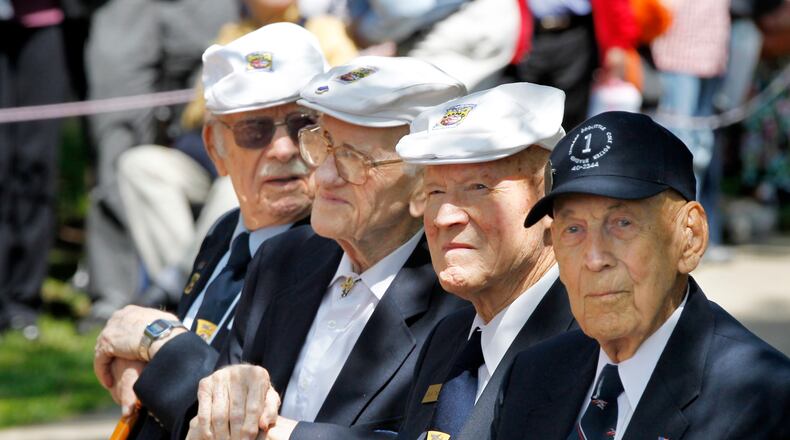Richard Cole, the B-25 co-pilot to the legendary Lt. Col. Jimmy Doolittle during the raid, was modest about the latest accolade in the works.
“All along through the years, I didn’t really ever believe that the Raiders should be singled out,” the 97-year-old Dayton native said in a telephone interview Friday. “We were just a group of young people that answered the call, and that was it. That was among the millions that did the same thing.”
Four of the five then surviving Doolittle Raiders participated in a 70th anniversary commemoration of the raid last year at the museum.
On April 18, 1942, 80 Doolittle Tokyo Raiders launched 16 Army Air Force B-25 bombers off the Navy carrier deck of the U.S.S. Hornet to strike targets in Japan four months after the Japanese attacked U.S. sailors and airmen based at Pearl Harbor, Hawaii. The propeller-powered airplanes launched sooner than planned because a small Japanese ship spotted the U.S. naval task force. All 16 planes bombed their targets, and all but one crashed on the return flight. Eight airmen were captured as POWs in Japan, and three of them were later executed. A fourth died in captivity. One of the bombers landed in Russia, where the crewmen were internees. Another airman died in a bailout and two others drowned off the coast of China, according to the Doolittle Tokyo Raiders Web site.
U.S. Sen. Sherrod Brown, D-Ohio, sponsored the Senate version of the bill to honor the Doolittle Raiders achievement. U.S. Rep. Mike Turner, R-Dayton, is a co-sponsor of the House version.
“I just think you honor history and you honor these men … for really helping in many ways turning the tide in the Pacific,” Brown said in an interview. “… Their courage was beyond question for something that is almost unsurpassed.”
Jeffrey S. Underwood, an Air Force museum historian, said the mission changed despondent American perceptions of the war and forced the Japanese military to bring more forces back to the homeland.
“The reason that it’s so well remembered by so many people is it was absolutely a game changer,” he said.
The Congressional Gold Medal would be added to a permanent Doolittle Raiders display at the museum where, along with a B-25 on a mock-up of the Hornet’s deck, silver goblets symbolizing each of the Raiders is on display behind a glass showcase.
The congressional legislation needs two-thirds support in both the House and the Senate for consideration.
About the Author
